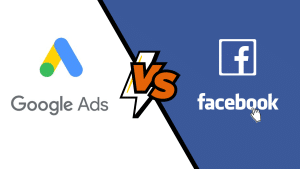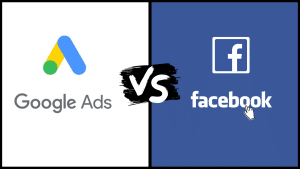Facebook Ads VS Google Ads: Which Is Best for Business?
Are you trying to choose between Facebook ads vs Google ads?
Facebook and Google offer unique advantages and can be powerful tools for reaching your target audience. However, you need to understand their differences to maximize your return on investment.
This blog post will help you determine the best option for your business between Facebook and Google ads.
Facebook Ads vs. Google Ads: The Differences

Choosing the right platform can make or break the success of your ad campaign. Google and Facebook ads are excellent options with unique strengths and purposes. Below, we will explain what set them apart:
1. Intent vs social engagement.
Google ads thrive on intent-based targeting. Users actively use Google Search to look for specific products or services. Hence, Google search ads are an abundant source for businesses looking to capture potential customers at the moment of interest. Keywords play a pivotal role here, ensuring your ad appears in users’ Google search results when they search for terms related to your offerings.
In contrast, Facebook advertising leverages social engagement. Users on this platform aren’t necessarily searching for products; they’re scrolling through their feeds, connecting with friends, and discovering content. Facebook ads excel in targeting specific demographics and interests, allowing businesses to create visually appealing ads that interrupt the user’s scroll with compelling content.
2. Ad formats and creativity.
Google ads offer text-based, display, and video ads on YouTube. While text ads are concise and effective, video and Google display ads allow for more visual creativity. However, the emphasis here is on delivering a clear and direct message to users seeking information on the Google display network.
Facebook offers a wide range of ad formats, including image ads, video ads, carousel ads, shopping ads, banner ads, and more. The platform encourages creative storytelling and visually engaging content. By focusing on capturing attention in a social feed, you can experiment with each ad format to find what resonates best with your target audience.
3. Targeting option.
Google’s targeting revolves around keywords and user intent. You can tailor your Google advertising campaigns based on search queries, demographics, and user behavior. The emphasis is on delivering the right ad to the right person at the right time, primarily driven by the intent behind the user’s search.
Facebook offers highly detailed targeting options, allowing you to reach users based on demographics, interests, behaviors, and life events. The platform’s rich user data enables businesses to fine-tune their campaigns, making it ideal for reaching specific niche audiences.
4. Cost structure.
Google Ads operates on a pay-per-click (PPC) or cost-per-click (CPC) model. Advertisers are charged when users click on their ads. The cost can vary based on competition for keywords and ad placement.
Facebook employs a more flexible pricing model, including CPC, cost-per-mille (CPM), and cost-per-action (CPA). You can choose the most suitable option based on your campaign objectives and ad budget, whether it’s driving clicks, impressions, or specific actions on the ad.
Benefits of Using Google Ads for Your Business

Google ads empower businesses to reach their target audience with precision and impact. The following are the key benefits that make Google Ads an indispensable tool for businesses looking to boost their online presence and drive results:
1. Intent-driven targeting.
One of Google ads’ unparalleled strengths lies in its intent-driven targeting. When users turn to Google, they express specific needs through search queries.
2. Extensive reach through the Google display network.
Google ads aren’t restricted to Google’s search results. They extend across a vast network, including partner websites, YouTube, Gmail, and Google Maps. This expansive reach ensures that your Google ads campaign has the potential to connect with users across diverse online platforms, maximizing visibility and engagement.
3. Flexible budgeting and bidding options.
Whether you’re a small startup or an established enterprise, you can set daily or monthly budgets that align with your financial goals. Additionally, the ad platform provides various bidding strategies. This allows Google advertisers to optimize their campaigns based on specific objectives, such as clicks, impressions, or conversions.
Benefits of Using Facebook Ads for Your Business
Facebook ads offer brands a vibrant platform to engage users in a way that goes beyond traditional advertising. Below are the benefits of using Facebook ads for your enterprise:
1. Unrivaled social engagement.
Facebook ads leverage the platform’s social nature, allowing businesses to engage with users personally. Through compelling visuals, captivating content, and interactive formats, brands can seamlessly integrate into users’ social feeds and connect with them.
2. Precise targeting for customized audiences.
Facebook’s robust targeting options empower advertisers to tailor their campaigns precisely. Businesses can define their audience based on demographics, interests, behaviors, and even life events. This level of customization ensures that ads reach the most relevant individuals.
3. Diverse ad formats for creative expression.
Facebook ads allow creative expression by offering diverse ad formats to suit different campaign goals. Hence, businesses are encouraged to experiment and find the most effective way to captivate their audience.
Conclusion
The right choice between these ad platforms ultimately depends on your business goals, target audience, and the nature of your products or services. While Google Ads excels in capturing intent-driven searches, Facebook Ads offers a more creative and socially engaging approach. Also, combining Google Ads and Facebook strategically can provide a well-rounded digital advertising strategy. Whatever your marketing goals are, our digital advertising agency can help you achieve them.
Frequently Asked Questions
Which platform is better for brand awareness: Facebook or Google ads?
Facebook ads are the right option to build brand awareness and engage users in a social context.
Are there differences in ad formats between Facebook and Google Ads?
Google ads primarily offer text-based, display, and video ads on platforms like YouTube. In contrast, Facebook ads have diverse formats, including images, videos, and carousel ads.
Which platform is more suitable for local businesses: Facebook or Google Ads?
Google ads’ geotargeting options make it a powerful choice for local businesses targeting specific geographic areas.
